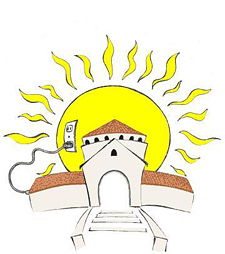The proposals, all authored by Humboldt State University students, consist of retrofits to the heating, ventilating and air conditioning system (HVAC) in Science Complex’s buildings D and E, two solar thermal panels for the rooftop of the Campus Center for Appropriate Technology (CCAT) and a two-year student energy internship position.

“It’s exciting to see the quality and thoroughness of the student’s grant proposals. Their knowledge, skills and professionalism shines through,” says committee member, and Professor of the Theatre, Film & Dance Department, Ann Alter.
The biggest energy savings will come with the HVAC retrofits for Science D and E on the scale of 180,000 kWH electricity and 0-5000 therms natural gas annually. That equates to 45 tons of CO2 avoidance every year.
The project consists of three separate energy efficiency measures: hot water loop insulation, converting the pneumatic air and heat controls to direct digital controls and installing variable frequency drives on the supply and return fans. The financial benefit from avoided energy costs is estimated to be at least $390,000 over a 20 year period.
The solar thermal panel project will provide hot water and heat for CCAT, but more importantly it will serve as an educational tool for the campus and community.
The system includes a monitoring and data collection system that will be utilized in a variety of classes at the University and will allow CCAT to scientifically quantify energy production and savings. An interpretive sign to further educate the public will accompany the panels.
Professional progression toward energy independence demands scientific rigor. With a building energy intern, specific energy data for the campus will be collected and analyzed. This information is invaluable to the campus as it moves toward energy independence.
A competition to create a specific plan of action for generating this energy database will occur in spring 2009. The student with the most innovative and thorough proposal will be hired.
“The quality of the student proposals provides a concrete indication of the knowledge, communication skills and the dedication of the students on our campus,” says committee member, and Professor of Economics, Steven Hackett.
The variance in the proposals illustrates several different elements that the committee is looking for: energy generation, education and data acquisition and quantification.
Students will work with contractors on the installation of the projects to provide more of the hands-on learning experiences that Humboldt State is known for.
Information and data from the projects will be used in multiple classes to demonstrate real-world applications.
The Humboldt Energy Independence Fund is funded by students and granted to students in a collaborative effort to make Humboldt State an educational hub for model environmental stewardship. Visit their Web site for more information.